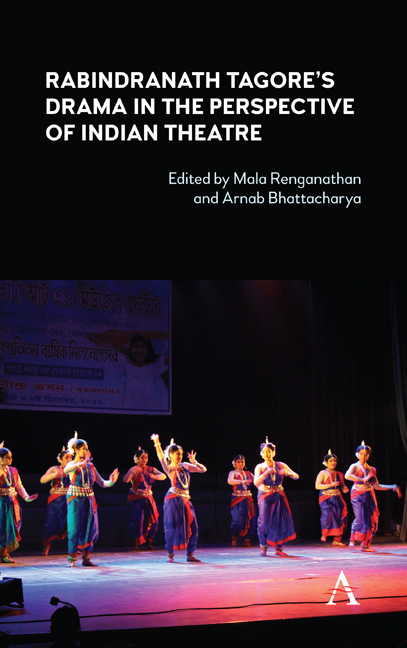Chapter 8 - Encounters and Exchanges: An Intercultural Interrogation of Rabindranath Tagore’s Dramaturgy in Muktadhara
Published online by Cambridge University Press: 20 January 2022
Summary
A cult figure today, Rabindranth Tagore was really an iconoclast during his time. His ability to make departures and create new paradigms in thought and dramaturgy is encapsulated in his 1922 play Muktadhara. This chapter will interrogate Tagore's revolutionary departures from the conventional through an intercultural analysis of the play. Beginning with a brief review of the sociopolitical background of the play, the chapter will scrutinize the raison d’être behind Tagore's move towards interculturalism in his politics and art. Was it his actual exposure to foreign cultures or his awareness of the limitations of European style public theatre and native folk forms that catalysed his evolution of an intercultural Santiniketan style of theatre? What were the aims of his theatre of ideas and the symbolic, poetic, non-naturalistic nature of Tagore's dramaturgy? Does Muktadhara concretize Tagore's political philosophy and personal ideology? What are Tagore's ideas on kingship, materialism and the machine in the context of the play and the period during which it was written?
Tagore has too long been considered a sage or bard composing music and dance in an idyllic Santiniketan. Nothing perhaps can be further from the truth. Tagore, rather, was a man, who was deeply skeptical; self-critical; tormented by conflicts in his ‘inner life’; aware of the historical significance of his times and continually interacted with adversaries and friends across the world; someone who built on the heritage of the nineteenth century renaissance in India and became one of the makers of the modern Indian mind. Young Rabi rebelled against ‘Western’ schooling; suffered from chronic loneliness in childhood and after; and imbibed the cultural and literary climate in his privileged family; he also engaged as a cultural leader with the Swadeshi movement on Bengal's partition in 1905; founded the school in Santiniketan and renounced his knighthood after Jallianwala Bagh. Through his eighty-one years; Tagore swung between public life and seclusion of a poet. Over time; he would reinvent his creative self.
It is in the reinvention of his creative self lies the significance of Tagore's legacy and the focus of this chapter. At the turn of the century, it was necessary to awaken the sleeping Indian national consciousness into an awareness of her subservience and remind her of the glories of her past and the great possibilities of the future.
- Type
- Chapter
- Information
- Rabindranath Tagore's Drama in the Perspective of Indian Theatre , pp. 121 - 134Publisher: Anthem PressPrint publication year: 2020



